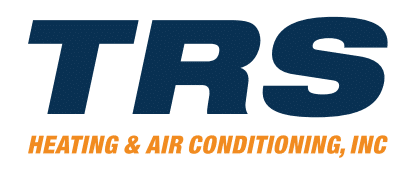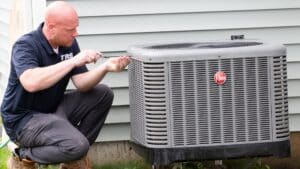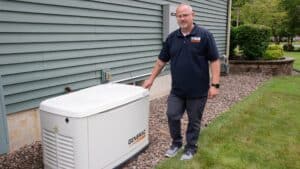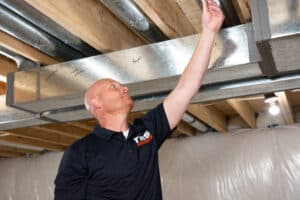August 15, 2025
Are you considering a career change or wondering what path to take after high school? The skilled trade careers might be the answer you’re looking for. With millions of job openings, competitive salaries, and unmatched job security, skilled trades offer opportunities that many four-year degree programs simply can’t match.
The skilled trade career industry is experiencing unprecedented growth, and there’s never been a better time to consider this rewarding career path. Among all the skilled trades, HVAC (Heating, Ventilation, and Air Conditioning) careers stand out as particularly promising. From electricians and plumbers to welders and HVAC technicians, skilled tradespeople are the backbone of our economy, keeping our infrastructure running and our communities thriving. HVAC professionals, in particular, ensure that homes, businesses, and industrial facilities maintain comfortable, healthy indoor environments year-round.
1. Exceptional Job Security and High Demand
The demand for skilled trade career workers has reached critical levels across the United States, with HVAC technicians experiencing some of the strongest growth in the industry. According to the Bureau of Labor Statistics, employment in construction and extraction occupations is projected to grow 4% from 2022 to 2032, adding about 304,000 new jobs. However, HVAC jobs are projected to grow even faster at 6% through 2032, making this one of the most in-demand trades.
The HVAC industry benefits from several growth drivers that ensure long-term job security:
- Increasing construction of energy-efficient buildings
- Growing demand for smart home technology integration
- Rising focus on indoor air quality post-pandemic
- Climate change driving more extreme temperatures and increased reliance on HVAC systems
- Aging infrastructure requiring system upgrades and replacements
The skilled trades shortage has created what economists call a “seller’s market” for workers, and HVAC technicians are particularly sought after. With baby boomers retiring at unprecedented rates and fewer young people entering the trades, HVAC employers are competing fiercely for qualified candidates.
2. Competitive Salaries Without Student Debt
One of the most compelling reasons to pursue skilled trades, especially HVAC, is the earning potential without the burden of student loans. HVAC technicians enjoy some of the most competitive starting salaries in the trades, with significant opportunities for advancement.
Consider these median annual salaries for skilled trades professionals from the Bureau of Labor Statistics, with HVAC showing strong earning potential:
- HVAC Technicians: $56,000-$75,000+ (with experienced technicians earning $80,000+)
- Power plant operators: $95,000+
- Electrical power-line installers: $85,000+
- Electricians: $60,000+
- Plumbers: $59,000+
HVAC professionals can significantly boost their earnings through specializations:
- Commercial HVAC systems: $65,000-$90,000+
- Industrial refrigeration: $70,000-$95,000+
- HVAC system design and engineering: $80,000-$110,000+
- Business ownership: $100,000-$500,000+ annually
Unlike college graduates who often start their careers with $30,000+ in student debt, HVAC workers typically earn while they learn through apprenticeships and on-the-job training programs.
3. Fast Entry into the Trade Career Workforce
While your friends spend four years in college classrooms, you could be earning a paycheck and gaining real-world experience in HVAC. Most HVAC programs can be completed in 6-18 months, and many offer apprenticeships that allow you to earn money while learning.
HVAC training pathways include:
- Certificate programs (6-12 months)
- Associate degree programs (2 years)
- Apprenticeships (2-4 years, paid training)
- On-the-job training with experienced technicians
- Manufacturer-specific certification programs
This quick entry into the workforce means you’ll have a 4-6 year head start on building your career, gaining experience, and establishing financial stability. By the time college graduates enter the job market, you could already be a certified HVAC journeyman with years of experience and a proven track record.
4. Hands-On, Meaningful Work
If you’re tired of sitting behind a desk all day, HVAC careers offer the perfect alternative. HVAC work provides tangible, hands-on challenges where you can see the direct results of your efforts. Whether you’re installing a new heating system, troubleshooting an air conditioning problem, or designing ventilation solutions, you’ll experience the satisfaction of solving real problems and creating comfortable environments for people.
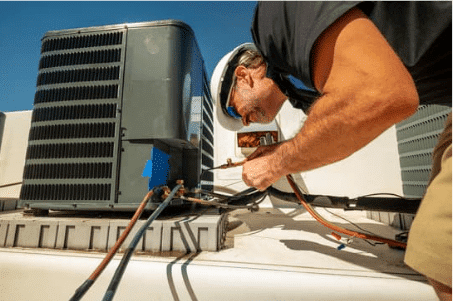
HVAC work offers incredible variety:
- Residential service calls and installations
- Commercial building system maintenance
- Industrial equipment troubleshooting
- New construction installations
- Energy efficiency retrofits
- Smart home technology integration
As Mike Rowe, host of “Dirty Jobs” and founder of the Mike Rowe Works Foundation, puts it: “We are lending money we don’t have to kids who can’t pay it back to train them for jobs that no longer exist. That’s nuts. Stop the madness. A skilled worker – regardless of their field – is a treasure, and our country needs more of them.”
5. Entrepreneurship Opportunities
The HVAC industry offers exceptional opportunities for entrepreneurship and business ownership. Many HVAC technicians eventually start their own companies, becoming their own bosses and building generational wealth. According to the Small Business Administration, construction businesses represent one of the largest segments of small business ownership in America. The residential and commercial HVAC service market represents billions in annual revenue, with consistent demand regardless of economic conditions.
HVAC business opportunities include:
- Residential service and repair companies
- Commercial HVAC contractors
- Specialized services (duct cleaning, energy audits, smart home integration)
- Equipment sales and distribution
- Maintenance contract services
Starting an HVAC business often requires less capital than other industries, and the demand for climate control services ensures a steady stream of potential customers. From small residential repairs to large commercial installations, HVAC entrepreneurs can scale their businesses to match their ambitions.
6. Geographic Flexibility and Travel Opportunities
HVAC skills are in demand everywhere, giving you the flexibility to work virtually anywhere in the country or even internationally. Whether you prefer small-town living or big-city excitement, your HVAC skills will be valuable in any location, as every building needs climate control.
HVAC professionals enjoy excellent mobility:
- Seasonal work opportunities (following weather patterns)
- Commercial project travel
- Specialized industrial work across regions
- International opportunities in developing markets
- Remote area work (oil fields, mining operations, military bases)
Many HVAC technicians also find opportunities in specialized travel roles, such as working on large commercial projects, cruise ships, or providing service for national retail chains across multiple locations.
7. Physical and Mental Health Benefits of Trade Careers
HVAC work offers significant physical and mental health benefits compared to sedentary office jobs. The physical nature of the work helps maintain fitness and reduces the health risks associated with prolonged sitting. HVAC work provides an ideal balance of physical activity and technical problem-solving that keeps both body and mind engaged.
Health benefits of HVAC careers include:
- Regular physical activity and movement
- Problem-solving challenges that stimulate mental acuity
- Variety in work environments and tasks
- Satisfaction of completing tangible projects
- Social interaction with customers and team members
Studies have shown that workers in active occupations often experience lower rates of depression and anxiety, partly due to the physical activity and the satisfaction of completing projects that directly improve people’s comfort and quality of life. Research from the National Institute for Occupational Safety and Health (NIOSH) supports the physical and mental health benefits of active work environments.
8. AI-Proof Career Security
While artificial intelligence and automation are disrupting many industries, HVAC careers remain highly resistant to technological displacement. The hands-on, problem-solving nature of HVAC work requires human intuition, physical dexterity, and real-world adaptability that AI cannot replicate.
Why HVAC jobs are automation-resistant:
- Complex physical installations in unique environments
- Real-time troubleshooting of interconnected systems
- Customer service and communication requirements
- Safety-critical decisions requiring human judgment
- Adaptability to unexpected field conditions
- Integration of multiple building systems and technologies
According to research from Oxford Economics, jobs requiring manual dexterity, creativity, and on-site problem-solving have the lowest risk of automation. HVAC technicians consistently rank among the most “automation-resistant” careers because they require complex physical manipulation in unpredictable environments, real-time problem-solving, human judgment for safety and quality decisions, and interpersonal skills for customer service.
While AI and smart technology may enhance the tools and diagnostic capabilities used by HVAC professionals (such as smart thermostats and predictive maintenance systems), these advances create new opportunities rather than replace skilled technicians who install, maintain, and troubleshoot these sophisticated systems.
Getting Started in HVAC and Other Skilled Career Trades
Ready to explore a career in HVAC or other skilled trades? Here are your next steps:
- Research HVAC training programs at local trade schools and community colleges
- Look into EPA certification requirements (mandatory for handling refrigerants)
- Contact local HVAC contractors about apprenticeship opportunities
- Explore manufacturer training programs (Carrier, Trane, Lennox, etc.)
- Consider specialization areas (residential, commercial, industrial, or green energy systems)
General skilled trades exploration:
- Research different trades to find one that matches your interests and aptitudes
- Contact local trade schools and community colleges about programs
- Speak with working tradespeople to get firsthand insights about different careers
- Consider visiting job sites to observe different trades in action
The HVAC industry and skilled trades offer a clear path to financial security, job satisfaction, and career growth without the burden of student debt. With millions of job openings and competitive salaries, there’s never been a better time to consider this rewarding career path.
Don’t let outdated stereotypes keep you from exploring one of America’s most promising career sectors. The skilled trades are building the future – and they’re looking for talented, motivated people like you to join them.
Ready to start your skilled trade career?
Consider joining the TRS team, where our expert HVAC professionals are building fulfilling careers that will last for decades . As a family-owned business, TRS offers something you won’t find at large corporations – the opportunity to become part of the TRS family. Whether you’re just starting out or looking to advance your HVAC career, TRS offers the training, support, and opportunities you need to succeed in one of the most in-demand skilled trades. Click here to learn how you can become part of Western New York’s premier HVAC family at TRS Heating & Air Conditioning, Inc.
